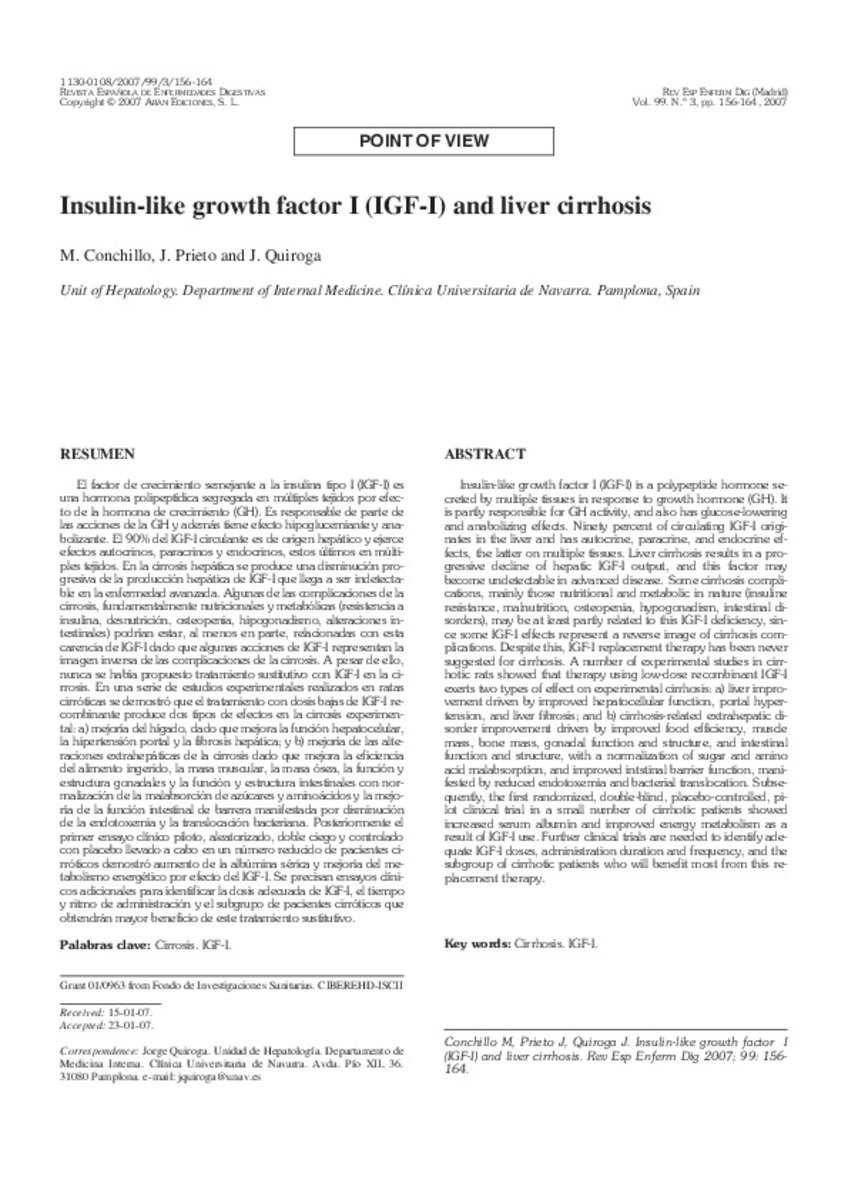Full metadata record
| DC Field | Value | Language |
|---|---|---|
| dc.creator | Conchillo, M. (M.) | - |
| dc.creator | Prieto, J. (Jesús) | - |
| dc.creator | Quiroga, J. (Jorge) | - |
| dc.date.accessioned | 2012-06-22T18:15:46Z | - |
| dc.date.available | 2012-06-22T18:15:46Z | - |
| dc.date.issued | 2007 | - |
| dc.identifier.citation | Conchillo M, Prieto J, Quiroga J. Insulin-like growth factor I (IGF-I) and liver cirrhosis. Rev Esp Enferm Dig 2007 Mar;99(3):156-164. | es_ES |
| dc.identifier.issn | 1130-0108 | - |
| dc.identifier.uri | https://hdl.handle.net/10171/22693 | - |
| dc.description.abstract | Insulin-like growth factor I (IGF-I) is a polypeptide hormone secreted by multiple tissues in response to growth hormone (GH). It is partly responsible for GH activity, and also has glucose-lowering and anabolizing effects. Ninety percent of circulating IGF-I originates in the liver and has autocrine, paracrine, and endocrine effects, the latter on multiple tissues. Liver cirrhosis results in a progressive decline of hepatic IGF-I output, and this factor may become undetectable in advanced disease. Some cirrhosis complications, mainly those nutritional and metabolic in nature (insuline resistance, malnutrition, osteopenia, hypogonadism, intestinal disorders), may be at least partly related to this IGF-I deficiency, since some IGF-I effects represent a reverse image of cirrhosis complications. Despite this, IGF-I replacement therapy has been never suggested for cirrhosis. A number of experimental studies in cirrhotic rats showed that therapy using low-dose recombinant IGF-I exerts two types of effect on experimental cirrhosis: a) liver improvement driven by improved hepatocellular function, portal hypertension, and liver fibrosis; and b) cirrhosis-related extrahepatic disorder improvement driven by improved food efficiency, muscle mass, bone mass, gonadal function and structure, and intestinal function and structure, with a normalization of sugar and amino acid malabsorption, and improved intstinal barrier function, manifested by reduced endotoxemia and bacterial translocation. Subsequently, the first randomized, double-blind, placebo-controlled, pilot clinical trial in a small number of cirrhotic patients showed increased serum albumin and improved energy metabolism as a result of IGF-I use. Further clinical trials are needed to identify adequate IGF-I doses, administration duration and frequency, and the subgroup of cirrhotic patients who will benefit most from this replacement therapy. | es_ES |
| dc.language.iso | eng | es_ES |
| dc.publisher | The Spanish Society of Digestive Pathology | es_ES |
| dc.rights | info:eu-repo/semantics/openAccess | es_ES |
| dc.subject | Cirrhosis | es_ES |
| dc.subject | IGF-I | es_ES |
| dc.title | Insulin-like growth factor I (IGF-I) and liver cirrhosis | es_ES |
| dc.title.alternative | Factor de crecimiento semejante a la insulina tipo I (IGF-I) y cirrosis hepática | - |
| dc.type | info:eu-repo/semantics/article | es_ES |
| dc.type.driver | info:eu-repo/semantics/article | es_ES |
| dc.identifier.doi | http://dx.doi.org/10.4321/S1130-01082007000300007 | es_ES |
Files in This Item:
Statistics and impact
Items in Dadun are protected by copyright, with all rights reserved, unless otherwise indicated.






